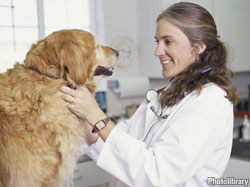
(ARA) – You vaccinate your dog against rabies, and take the right steps to ensure she’s not at risk from heartworms and other parasites. But do you know how to recognize early signs of one of the most common – and malignant – forms of cancer in your best friend?
Canine oral melanoma, characterized by tumors in a dog’s mouth, or on its skin, nailbed or footpad, is a very common type of cancer that often spreads to other parts of the body and resists chemotherapy. A dog diagnosed with stage II or stage III oral cancer will typically survive less than five to six months when treated with surgery alone.
Oral tumors are rarely spotted early, simply because it can be hard to look inside a dog’s mouth to find these warning signs. Fortunately, your veterinarian can easily detect tumors of the mouth during a routine oral exam. And you can monitor your pet by watching for the secondary warning signs of tumors, including:
* Difficulty swallowing
* Bad breath
* Bleeding
* Loss of teeth
* Facial swelling
Call your veterinarian right away if you notice any of these signs. He or she will know best how to proceed with diagnosing the problem. If your pet has oral cancer, early diagnosis and a combination of treatments, including surgery and a DNA-based vaccine for canine cancer can help extend the life of a dog.
The treatment, Oncept, helps a dog’s immune system recognize the presence of cancer cells, allowing the animal’s own system to fight the disease. When used with surgery and/or radiation to treat a tumor, this immune response may help extend survival time for most dogs. Clinical studies of Oncept, which is manufactured by Merial, demonstrated significantly longer life spans for dogs diagnosed with stage II or stage III oral melanoma. More than half the dogs treated were cancer-free at the end of the clinical study.
Ask your veterinarian about routine oral exams. If diagnosed with oral melanoma, ask your veterinarian if Oncept is the right treatment option for your best friend. Routine oral exams and your vigilance can help you detect oral melanoma early.





